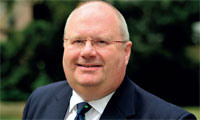
Eric Pickles – Secretary of State for Communities and Local Government.
Treasury ministers have announced a potential £1bn spending round boost to the Coalition’s troubled families initiative – which would see the DCLG continue to run the payment-by-results scheme and receive funding from across Whitehall.
This additional investment in the Troubled Families Programme is great news and will help over three times the number of families.
The challenge is identifying families that meet the criteria, by linking data across housing, police systems, probation, youth offending, education and social services.
Jonathan Werran wrote the following article on www.localgov.co.uk
An annual £200m cash injection, as set out for 2015/16, would support a more than threefold increase in the number of chaotic households the programme could help – from 120,000 currently to 400,000 over the next five-year spending review period.
Latest official figures suggest some 35,000 families, around a third of the total households targeted by the DCLG, are involved in the programme – which has £448m funding over the current spending review period and includes all 152 upper tier English local authority areas.
News of the funding increase follows weekend newspaper reports alleging Louise Casey, head of the troubled families unit, had made last minute attempts to seize greater control over the £9bn spent across Whitehall departments in tackling high risk families
Research issued in February suggests the bulk of this money, around £8bn is devoted to reactive spending on child protection and criminal justice. Only £1bn of the expenditure on problem families was targeted on intervention schemes such as Sure Start.
Chief secretary to the Treasury, Danny Alexander, said: ‘Reforming how services are delivered is going to be a central part of this week’s Spending Round.’
‘The government is committing £200m in funding in 2015/16 and for every £4,500 spent on a family, we can reduce the annual £15,000 cost of dealing with their problems by reducing the burden on the police, health and social services,’ added Mr Alexander.
Central government would continue to cover 40% of the costs of supporting each family, with budgets drawn from the DCLG, Department for Education, Department of Health and Department for Work and Pensions. The remaining 60% would be met by local authorities and service providers likely to benefit from the scheme.
Under the expanded troubled families programme, there would be new incentives for local services, like the police, health and social services to work closer together to slash costs and deliver better results.
Communities secretary Eric Pickles expressed his delight the announcement meant the DCLG would be able to continue the progress in ‘taking a no-nonsense approach with families and a common sense approach to changing the way services are run’.
According to troubled families programme head, Louise Casey, the extra cash would allow the approach to be extended to a wider group of families, like those struggling with health problems or parenting – where children are not attending school or risk being taken into care.
‘This new programme will enable us to help earlier in families’ lives to change them for the better,’ Ms Casey said.